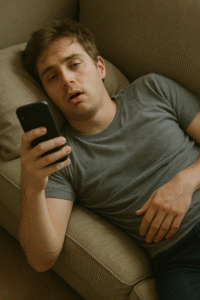
Are Phones Becoming a Health Checkup Device? Will They Ever Replace Your Doctor?
So, let’s talk about something wild—your phones might be your next doctor. Yup, that little screen you scroll on for memes and cat videos is slowly creeping into the healthcare world, and honestly, it’s kinda impressive.
These days, smartphones can track your steps, measure your heart rate, even remind you to drink water (which, let’s be real, you probably ignore half the time). Some apps claim they can analyze your cough, detect skin conditions, or even do an eye exam. It’s like carrying a mini-hospital in your pocket. But the big question is—can it ever replace your actual doctor?
Phones & Health—Where We Are Now
Technology has a way of sneaking up on us. One day, we’re using a Nokia brick phone to play Snake, and the next, we’re measuring our blood oxygen levels on a smartwatch. It’s crazy.
Health apps are popping up everywhere. Got a weird mole? Snap a picture, and some AI-powered app will tell you if it looks sketchy. Feeling sick? Punch in your symptoms, and an app will diagnose you (though let’s be honest, it probably tells you that you have everything from the common cold to a life-threatening disease). Some fitness apps even track your sleep, monitor stress, and give suggestions on how to improve your overall health.
Wearable tech is also jumping in—smartwatches can check heart rates, ECGs, and blood oxygen levels. Some even predict heart issues before you feel any symptoms. It’s honestly mind-blowing.
Can Phones Handle Real Medical Checkups?
So, we have all this cool tech, but can it do a real checkup? Like the kind where a doctor listens to your lungs, pokes around your stomach, and asks awkward personal questions?
For basic things, sure. Phones can track vitals and give alerts when something seems off. They can even collect data over time, helping people notice trends in their health before a problem gets worse. Doctors are actually using some phone-based data to monitor patients remotely. Especially for chronic conditions, having health info constantly tracked and sent to a doctor can be a game-changer.
But here’s the reality—your phone can’t replace experience. A doctor doesn’t just look at numbers and stats; they see patterns, they feel signs of illness, and they notice subtle symptoms that an app might miss. A phone can tell you if your heart rate is high, but a doctor can tell you why it’s high. A phone can’t do a blood test, check reflexes, or prescribe medicine properly.
The Future—Will Phones Replace Doctors?
Alright, so what happens in the future? Will we just FaceTime an AI doctor, let it analyze our voice and facial expressions, and get a prescription via an app?
It’s possible that technology will advance enough to handle more complex diagnoses, maybe even detect diseases early just by scanning our faces or analyzing speech patterns. AI is already moving in that direction, and medical chatbots are getting smarter.
But will it replace doctors? Probably not. Technology will keep improving, but there are limits. People need human interaction when it comes to health—especially when facing serious issues. A phone might catch early signs of illness, but a doctor is still the one making the final call. Plus, there’s a trust factor. Would you trust an app more than a trained doctor who’s been working in medicine for years? Doubt it.
Final Thoughts
Phones are definitely stepping into the healthcare world, and honestly, it’s pretty exciting. We’re heading toward a future where medical advice, checkups, and even treatments might become more digital and accessible. But at the end of the day, healthcare isn’t just numbers and data—it’s experience, intuition, and human connection.
So sure, your phone might help you keep track of your health, but when it comes to real medical care, doctors aren’t going anywhere. And personally, that’s a good thing.
















































1 comment